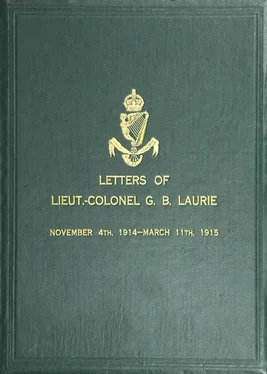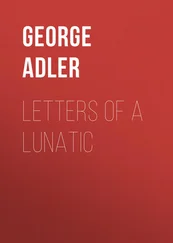George Laurie - Letters of Lt.-Col. George Brenton Laurie
Здесь есть возможность читать онлайн «George Laurie - Letters of Lt.-Col. George Brenton Laurie» весь текст электронной книги совершенно бесплатно (целиком полную версию без сокращений). В некоторых случаях можно слушать аудио, скачать через торрент в формате fb2 и присутствует краткое содержание. Город: Aldershot, Год выпуска: 1921, Издательство: Gale & Polden, Ltd, Жанр: Биографии и Мемуары, prose_military, на английском языке. Описание произведения, (предисловие) а так же отзывы посетителей доступны на портале библиотеки ЛибКат.
- Название:Letters of Lt.-Col. George Brenton Laurie
- Автор:
- Издательство:Gale & Polden, Ltd
- Жанр:
- Год:1921
- Город:Aldershot
- ISBN:нет данных
- Рейтинг книги:5 / 5. Голосов: 1
-
Избранное:Добавить в избранное
- Отзывы:
-
Ваша оценка:
- 100
- 1
- 2
- 3
- 4
- 5
Letters of Lt.-Col. George Brenton Laurie: краткое содержание, описание и аннотация
Предлагаем к чтению аннотацию, описание, краткое содержание или предисловие (зависит от того, что написал сам автор книги «Letters of Lt.-Col. George Brenton Laurie»). Если вы не нашли необходимую информацию о книге — напишите в комментариях, мы постараемся отыскать её.
Letters of Lt.-Col. George Brenton Laurie — читать онлайн бесплатно полную книгу (весь текст) целиком
Ниже представлен текст книги, разбитый по страницам. Система сохранения места последней прочитанной страницы, позволяет с удобством читать онлайн бесплатно книгу «Letters of Lt.-Col. George Brenton Laurie», без необходимости каждый раз заново искать на чём Вы остановились. Поставьте закладку, и сможете в любой момент перейти на страницу, на которой закончили чтение.
Интервал:
Закладка:
Colonel Fitch raised the regiment in Dublin six score years ago, and the Army of that time called them “Fitch’s Grenadiers,” because the men were small of stature. When they fought they were as giants, and later on the good physique of the men and their hardy endurance earned them the name of the “Irish Giants.” One branch of the regiment was raised in County Down, and to-day the name is perpetuated in the 4th and 5th Battalions, which are known as the Royal Down Militia, despite official changes of designation; and as a further link with the past the depot is in Belfast and the Record Office in Dublin.
When mobilization was ordered, one battalion of the Royal Irish Rifles was scorching under the sun at Aden, and the other was at Tidworth, on Salisbury Plain. The former were to take over the barracks of the latter, which unit was to commence at Malta, in the Winter of 1914, and a tour of service abroad. The latter, however, went out with their Tidworth comrades. It would be covering very old ground to repeat what magnificent work was done in the Great Retreat, when the Royal Irish Rifles showed themselves possessed of the grit which had characterised them at Stormberg, where the writer witnessed them scaling the face of a cliff of rock to get at the Boers, who had ambushed Gatacre’s force—an unforgettable and heroic sight. In the retreat towards Paris and the advance to the Aisne Lieutenant-Colonel W.D. Bird, Major C.R. Spedding, and a dozen others were mentioned by Lord French, and a D.S.O., a Military Cross, several D.C.M.’s, a Médaille Militaire, and a special promotion resulted, this being the beginning of many subsequent rewards.
In the Ypres—Armentières phase of the campaign, when the British Army skilfully withdrew to the north of the line, the 7th Brigade repulsed heavy assaults, and both battalions of the Royal Irish Rifles added to their lists of distinguished names. The victory at Neuve Chapelle further increased the record of the regiment, whose men charged the enemy in splendid fashion. Lieutenant-Colonel Laurie was killed, and his adjutant, Captain Wright, fell by his side, while Major Alston was also killed. All three were mentioned in despatches, as well as a score of others. At Hooge the Royal Irish Rifles tried to force their way into the enemy’s lines through uncut entanglement in the face of machine-gun fire, and their conduct all through the Loos operations was evidence of the high character of the regiment.
In the operations under Sir Douglas Haig in the early part of 1916 trench warfare, with its brilliant raids, two battalions were named for distinguished conduct, and the numbers as well as the names of the battalions were published in the list issued to the Press.
When the great advance began on July 1st, the Ulster Division attacked the strongest position in the line, and suffered heavily. An officer, describing this glorious attack, wrote:—“I am not an Ulsterman, but as I followed the amazing attack of the Ulster Division on July 1st, I felt that I would rather be an Ulsterman than anything else in the world.” With shouts of “Remember the Boyne” and “No surrender, boys,” they threw themselves at the Germans, and before they could be restrained had penetrated to the enemy’s fifth line. The Royal Irish Rifles went through hell that day, and sought out the machine gunners at the bayonet’s point. There has been nothing finer in the war than this charge.
What the regiment did at Guillemont and Ginchy is the talk of the moment, for, with the other Irish battalions, they accounted for all who came in their front—Guards, Line, and guns. Perhaps the two latest awards are among the best. The Victoria Cross was won by Privates Robert Quigg and William McFadzean. The former went out seven times in the heaviest fire for wounded men. The latter gave his life for his comrades by throwing himself on the top of two bombs and taking the whole force of the two explosions. He was blown to pieces. There are many other battle phases and incidents worthy of record, but that which has been written is enough to show what the old 83rd and 86th Foot, the men of County Down, Belfast, Antrim, the Young Citizens, and the others have done, and are doing, in this tremendous combat.
SPECIAL ORDER OF THE DAY BY HIS MAJESTY THE KING. [14] See page 29 .
Officers, Non-Commissioned Officers and Men—
I am very glad to have been able to see my Army in the Field.
I much wished to do so in order to gain a slight experience of the life you are leading.
I wish I could have spoken to you all, to express my admiration of the splendid manner in which you have fought and are still fighting against a powerful and relentless enemy.
By your discipline, pluck and endurance, inspired by the indomitable regimental spirit, you have not only upheld the tradition of the British Army, but added fresh lustre to its history.
I was particularly impressed by your soldierly, healthy, cheerful appearance.
I cannot share in your trials, dangers and successes; but I can assure you of the proud confidence and gratitude of myself and of your fellow countrymen.
We follow you in our daily thoughts on your certain road to victory.
GEORGE, R.I.
December 5th, 1914.
General Headquarters.
R.I.R.’s AT NEUVE CHAPELLE.
[ A Poem written by Rifleman J. Dickson. ]
Dear Franc,
Just a few lines of verse about the Royal Irish Rifles at Neuve Chapelle.—Yours truly,
No. 9180 Rifleman J. Dickson,
“A” Coy., 3rd Battalion Royal Irish Rifles, Dublin.
Come, please just pay attention, and a story I will tell
Of how the gallant R.I.R.’s were the first in Neuve Chapelle;
Colonel Laurie gave the order for the regiment to advance,
And when they met the Germans our boys did make them dance.
With bayonets fixed we rushed them, though outnumbered five to one;
Each one did prove a hero, and many a gallant deed was done;
Our noble Colonel, he was killed, our Major fell as well,
And a score of our brave officers lost their lives at Neuve Chapelle.
Our men were lost in hundreds, no regiment could do more,
And when the fight was over our officers numbered four;
Yet manfully they struggled amidst that living hell,
And out of all the British Army were the first in Neuve Chapelle.
Then here’s to the gallant R.I.R., those riflemen so brave,
Who nobly did their duty and found a soldier’s grave;
So may their glory ever shine, for they have proved their worth,
And laurels brought to Ireland for the honour of the North.
“THE MAN OF SORROWS.”
God hath sent thee many trials,
But strength is as thy day;
Do not despair or say, my child,
“I have no heart to pray.”
For God’s ways are not your ways,
And tho’ thou art bereft
Of all that’s most endearing,
There is one comfort left.
When a dear one has departed
To enter into rest,
And you feel so broken-hearted
That you cannot say “’Tis best”;
There is One Who will always help you
And bring you great relief:
For He was a Man of Sorrows
And acquainted sore with grief.
When your dearest idol’s taken
And you are dumb with pain;
When your faith in man is shaken
And everything seems vain,
There is One you can rely on,
Tho’ of sinners you are chief:
For He was a Man of Sorrows
And acquainted sore with grief.
Oh! weary, wandering, wilful child,
Think of that dying thief,
Who sought his Saviour, e’en tho’ late,
In the bitterness of grief;
And say no more you are alone,
Bereft of every friend:
The Man of Sorrows is your stay
And comfort to the end.
Интервал:
Закладка:
Похожие книги на «Letters of Lt.-Col. George Brenton Laurie»
Представляем Вашему вниманию похожие книги на «Letters of Lt.-Col. George Brenton Laurie» списком для выбора. Мы отобрали схожую по названию и смыслу литературу в надежде предоставить читателям больше вариантов отыскать новые, интересные, ещё непрочитанные произведения.
Обсуждение, отзывы о книге «Letters of Lt.-Col. George Brenton Laurie» и просто собственные мнения читателей. Оставьте ваши комментарии, напишите, что Вы думаете о произведении, его смысле или главных героях. Укажите что конкретно понравилось, а что нет, и почему Вы так считаете.












